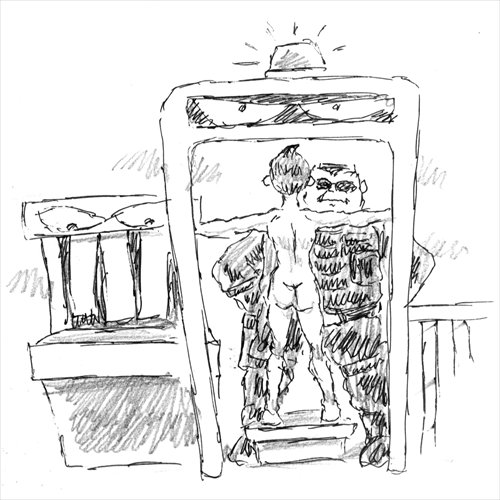Security ban on bras for gaokao rather misguided

Illustration: Peter C. Espina/GT
It's that time of year - again.
Some 9 million high school students across the country are busy cramming for the infamous national college entrance exams, or gaokao, the sole determinant for admission to virtually all Chinese universities and colleges.
But for students in Jilin Province, taking the test may not fare the most complicated of matters - entering the actual exam site might be. Contesters are not permitted to wear anything with metal. If a security machine spots the element, students will not be allowed to enter.
The machines won't even forgive the tiny clasps in girls' bras. In fact, female students are best advised to wear undershirts instead so that when they pass through security, no "zizi" sound is made. Those who successfully pass the machine will be tagged with a "qualified" badge on their clothes, a "coat of armor" that keeps them within the boundaries of the new rule.
The scenario reminds me of a scattering of live chicken, which have all been stamped to meet standards, before they are ready for sale in the markets.
Such a requirement is not without reason, however. Each year, cheating scandals during gaokao irritate the Chinese public, already shocked by the increasingly sophisticated methods being used.
The common tactic that used to be popular, in which students gave their identification cards to hired lookalikes, has become easily spotted and outdated. Later, students would be outfitted with tiny earpieces so that someone outside the exam site could transmit the answers by cellphone.
In 2008, it was reported that some girls in Jiangsu Province even took mini-cameras inside their bras so they could transmit images of the exam paper to people waiting elsewhere to provide the answers.
It explains why Jilin authorities are resorting to the "strictest" means to prevent cheats from arriving with high-tech devices, which cast a shadow over the test, considered to be a fair platform to assess the intelligence of all Chinese youth regardless of their backgrounds, be it those from well-off families or rural areas.
Yet, while ensuring a fair contesting field, the means of delivery is also a slap in the face of interpersonal credibility and human nature.
Referring to the overdrawing of creditability that leads to inflation and financial turmoil, the term "economic crisis" can also be applied to this circumstance in a more abstract theory: That is, in society, the overdrawing of credibility has led to the creation of absurd anti-cheating measures.
In other words, students have overdrawn their credibility from society by using astonishing cheating methods in exams. And in turn, the society is covering up its mistrust of students by carrying out privacy-breaching measures under the disguise of "fairness."
Setting aside the debatable move designed to extract bras from exam sites, more sad are the endless stories relating to gaokao that are telling of human nature. In previous years during gaokao, parents would form a "human wall" to prevent noisy vehicles from creating traffic that would disturb students burying themselves in the test; in another case, a boy only learned after gaokao that his beloved mother had died in a car accident days before he wrote the "destiny-determining" test.
It would be difficult to say that a successful gaokao should outweigh the credibility of society, much less the decency of human nature within its people.
There are many ways to right a wrong, and the most undesirable path is definitely one that incorporates another wrong. Let students enter the exam sites with fewer metallic elements to worry about, in as relaxed a state of mind as possible, and leave the matter of building a justified attitude toward gaokao to society as a whole.
The author is a reporter with the Global Times. wangwenwen@globaltimes.com.cn